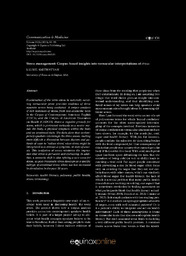
ATTENTION: The works hosted here are being migrated to a new repository that will consolidate resources, improve discoverability, and better show UTA's research impact on the global community. We will update authors as the migration progresses. Please see MavMatrix for more information.
Show simple item record
| dc.contributor.author | Stvan, Laurel Smith | |
| dc.date.accessioned | 2022-03-23T16:30:06Z | |
| dc.date.available | 2022-03-23T16:30:06Z | |
| dc.date.issued | 2013 | |
| dc.identifier.citation | Stvan, Laurel Smith. 2013. “Stress Management: Corpus-Based Insights into Vernacular Interpretations of Stress.” Communication & Medicine 10 (1): 81–93. | en_US |
| dc.identifier.other | DOI: 10.1558/cam.v10i1.81 | |
| dc.identifier.uri | http://hdl.handle.net/10106/30271 | |
| dc.description.abstract | **Please note that the full text is embargoed** ABSTRACT: Examination of the term stress in naturally occurring vernacular prose provides evidence of three separate senses being conflated. A corpus analysis of 818 instances of stress from non-academic texts in the Corpus of Contemporary American English (COCA) and the Corpus of American Discourses on Health (CADOH) shows a negative prosody for
stress, which is portrayed variously as a source outside the body, a physical symptom within the body
and an emotional state. The data show that contemporary speakers intermingle the three senses, making
more difficult a discussion between doctors and patients of ways to ‘reduce stress’, when stress might be
interpreted as a stressor, a symptom, or state of anxiety. This conflation of senses reinforces the impression
that stress is pervasive and increasing. In addition, a semantic shift is also refining a new sense for
stress, as post-traumatic stress develops as a specific subtype of emotional stress whose use has increased
in circulation in the past 20 years. | en_US |
| dc.language.iso | en_US | en_US |
| dc.publisher | Equinox | en_US |
| dc.subject | linguistics, corpus linguistics, medical humanities | en_US |
| dc.subject | polysemy, public health, terminology, health literacy | en_US |
| dc.subject | stress | en_US |
| dc.title | Stress management: Corpus-based insights into vernacular interpretations of "stress" | en_US |
| dc.type | Article | en_US |
Files in this item
- Name:
- Stvan (2013) Stress Management.pdf
- Size:
- 421.2Kb
- Format:
- PDF
This item appears in the following Collection(s)
Show simple item record


